

Pahalgam terror attack: Supreme Court refuses to hear PIL for judicial probe; allows petitioner to withdraw plea
PTC Web Desk: The Supreme Court on Wednesday refused to entertain a Public Interest Litigation (PIL) demanding a judicial inquiry into the recent terror attack in Pahalgam, Jammu and Kashmir, emphasising the need to support national security forces during critical times.
A Bench comprising Justices Surya Kant and N Kotiswar Singh dismissed the petition, citing concerns that such requests could potentially demoralise armed personnel actively engaged in combating terrorism. "This is a time when every citizen should stand united against terrorism. Please be responsible. Do not make submissions that can weaken the morale of those serving the country," the Bench stated firmly.
The petition, filed by Jammu and Kashmir residents Fatesh Kumar Shahu, Mohammad Junaid, and Vicky Kumar, called for a court-monitored probe led by a retired High Court or Supreme Court judge into the April 22 terror attack near Baisaran in Pahalgam, which claimed the lives of 26 persons, including a local resident.
The petitioners also sought the formation of a Special Investigation Team (SIT) by the Central government, along with an action plan involving the Jammu and Kashmir administration, Central Reserve Police Force (CRPF), and National Investigation Agency (NIA) to enhance safety in tourist zones across the Union Territory.
However, the court declined to consider the PIL, pointing out that retired judges are not equipped to conduct terrorism-related investigations. “Is this the way to deal with such sensitive issues? Since when have retired judges become investigation experts in counter-terrorism?” the court questioned, eventually allowing the lead petitioner to withdraw the plea.
During the hearing, the petitioners' counsel also raised concerns about the safety of Kashmiri students studying outside the Union Territory, alleging retaliatory incidents in the wake of the Pahalgam attack. The Bench, however, asked the counsel to clarify the nature of their requests and noted the inconsistency in the plea’s demands—from seeking judicial probes to compensation and press-related directives.
The court advised that if there were genuine concerns regarding the safety of students, the appropriate course would be to approach the relevant High Court for redress. “You have the liberty to approach the High Court concerned with these specific grievances,” the Bench concluded.
- With inputs from agencies
